Monthly Edition: November

Parallels Between Crimea and Gaza Reveal Important Geopolitical Implications for the EU
Monthly Edition: November

12/23/2023

Share
Chaeri Kang, Seunghee Kim
On February 21, 2022, Vladimir Putin announced a “Special Military Operation” on Ukraine, arguing that Russia and Ukraine should share a political destiny as they originated in the medieval Kyivan Rus commonwealth. The number of casualties and collapsed infrastructures since then have been lively, increasing as the forces struggled to defeat one another.
Now, as the Russo-Ukrainian War nears day 700, increasing political tension and distrust dawn the arena of global geopolitics. With news of the United States potentially seizing frozen assets from Russian banks, the Kremlin retaliated by threatening “serious consequences” in the case of such an event. China, on the other hand, has maintained close military and diplomatic ties with Russia, albeit an official statement in November asserting that China will “commit to promoting talks for peace and de-escalation.”
Military conflicts have also intensified, with the Ukrainian President Volodymyr Zelenskyy more people in the fight to remove the Russian forces from the territory recently stating that the Ukrainian military asked to mobilize an additional 500,000 troops. In addition, the report by the Estonian defense ministry states that “Sustaining this rate (of transporting war supplies) will empty European and US stockpiles over 2024 and will require significant foreign purchases of ammunition.” Russian casualties have also been significant, with U.S. intelligence estimating a death toll of approximately 315,000. This accounts for nearly 90% of the troops that it began with last February.
Simultaneously, as the humanitarian crisis worsens in Gaza, many news outlets are drawing parallels between the Israel-Hamas war and the Russia-Ukraine war. Nonetheless, Western response to the two conflicts have been vastly different. The European Union (EU), for instance, has emphasized that they will not be standing with Russia, wth EU Commission President Ursula von der Leyen constantly condemning Russian acts by referring to them as “acts of pure terror.” On the other hand, it has refrained from providing a definite stance to the problem, partly due to internal political rifts within the organization. Starting from EU High Representative Joseph Borrell's statement that the EU needs to provide more support to Palestine to von der Leyen asserting that "Europe stands with Israel," mixed sentiments surround the conflict.
In fact, the EU’s divide over the Israel-Palestine question has persisted since the mid-2010s. Due to the EU members’ different historical relations with Palestine and Israel, some insisted on the basic tenets such as Israel’s right of self-defense, while other European governments such as Germany, Austria, and the Czech Republic didn’t join to criticize Israel’s wide-ranging military operations.
Some interpret the conflicting responses to the Israel-Hamas war as a ‘benefit’ to Russia since it may have “...strengthened the belief that the Western-centric system of international relations is breaking down.” as spoken by Nikita Smagin, an expert with the Russian International Affairs Council.
Moving forward, it is imperative that the EU review and change its underlying incentive structures in a direction that can promote peace and stability in both Crimea and Gaza. With death tolls rising rapidly, it is time for the West to act now.
Robinson Review Favorites
Songi Chai, Yubin Cho, Seohyun Jang..
Trending on Robinson Review
Contact Us





